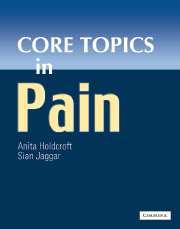Book contents
- Frontmatter
- Contents
- Contributors
- Preface
- Acknowledgements
- Foreword
- General abbreviations
- Basic science abbreviations
- PART 1 BASIC SCIENCE
- PART 2 PAIN ASSESSMENT
- Section 2a Pain measurement
- Section 2b Diagnostic strategies
- PART 3 PAIN IN THE CLINICAL SETTING
- Section 3a Clinical presentations
- Section 3b Pain syndromes
- PART 4 THE ROLE OF EVIDENCE IN PAIN MANAGEMENT
- PART 5 TREATMENT OF PAIN
- Section 5a General Principles
- Section 5b Physical treatments
- Section 5c Pharmacology
- Section 5d Psychosocial
- PART 6 SUMMARIES
- Glossary
- Index
Foreword
Published online by Cambridge University Press: 10 December 2009
- Frontmatter
- Contents
- Contributors
- Preface
- Acknowledgements
- Foreword
- General abbreviations
- Basic science abbreviations
- PART 1 BASIC SCIENCE
- PART 2 PAIN ASSESSMENT
- Section 2a Pain measurement
- Section 2b Diagnostic strategies
- PART 3 PAIN IN THE CLINICAL SETTING
- Section 3a Clinical presentations
- Section 3b Pain syndromes
- PART 4 THE ROLE OF EVIDENCE IN PAIN MANAGEMENT
- PART 5 TREATMENT OF PAIN
- Section 5a General Principles
- Section 5b Physical treatments
- Section 5c Pharmacology
- Section 5d Psychosocial
- PART 6 SUMMARIES
- Glossary
- Index
Summary
An understanding of pain management should be an essential component of the training for all healthcare professionals who deal with patients, irrespective of specialty. This includes doctors, nurses, dentists, physiotherapists and psychologists. All of them can contribute to a better outcome for patients who suffer pain.
There has been a huge explosion in our understanding of the basic mechanisms of pain and this is demonstrated in the first few chapters of this book. Despite these advances in physiology, pharmacology, psychology and related subjects, surveys repeatedly reveal that unrelieved pain remains a widespread problem. The challenges of pain management encompass more than just postoperative pain and includes other types of acute pain (e.g. trauma, burns, acute pancreatitis) as well as chronic pain and pain in patients with cancer. The range of topics dealt with in this book bear testament to the ubiquity of pain and the way in which pain impinges itself into virtually every realm of medical practice.
The cost of unrelieved pain can be measured in psychological, physiological and socio-economic terms. Governments around the world are developing awareness that pain and disability can be very expensive and that pain management strategies are sometimes very cost-effective. Despite this growing awareness there is a wide variation in provision of pain management services even in countries with developed health services such as the United Kingdom.
- Type
- Chapter
- Information
- Core Topics in Pain , pp. xv - xviPublisher: Cambridge University PressPrint publication year: 2005



